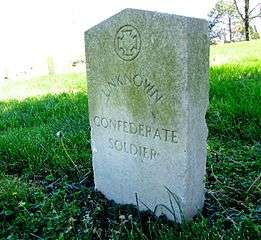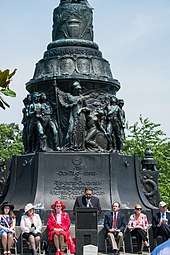Confederate Memorial Day
Confederate Memorial Day (called Confederate Heroes Day in Texas and Florida, and Confederate Decoration Day in Tennessee) is a cultural holiday observed in several Southern U.S. states on various dates since the end of the Civil War to remember the estimated 258,000 Confederate soldiers who have died in military service.[1]
| Confederate Memorial Day | |
|---|---|
 Standard government headstone for unknown Confederate soldier, Beechgrove, Tennessee | |
| Also called | Confederate Heroes Day, Confederate Decoration Day |
| Observed by | Southern states (United States) |
| Type | Cultural |
| Observances | Remembrance of Confederate soldiers who have died in military service |
| Date | |
| Frequency | annual |
| First time | April 26, 1866 |
| Related to | |
The holiday is observed in late April in many states to recall the surrender of the last major Confederate field army at Bennett Place on Wednesday, April 26, 1865.[2] The holiday is unofficially observed in most Southern states, and remains an official state holiday in South Carolina, Mississippi, Alabama, Florida[3] and Tennessee.[4][5][6][7]
Origins

In the spring of 1866 the Ladies Memorial Association of Columbus, Georgia, passed a resolution to set aside one day annually to memorialize the Confederate war dead. Mary Ann Williams, the association secretary, was directed to pen a letter inviting ladies associations in every former Confederate state to join them in the observance.[8] Their invitation was written in March 1866 and sent to all of the principal cities in the former Confederacy, including Atlanta;[9] Macon;[10] Montgomery; Memphis; Richmond; St. Louis; Alexandria; Columbia;[11] and New Orleans, as well as smaller towns like Staunton, Virginia;[12] Anderson, South Carolina;[13] and Wilmington, North Carolina.[14] The actual date for the holiday was selected by Elizabeth Rutherford Ellis.[15] She chose April 26, the first anniversary of Confederate General Johnston's surrender to Union Major General Sherman at Bennett Place. For many in the Confederacy, that date in 1865 marked the end of the Civil War.[8]
In their book, The Genesis of the Memorial Day Holiday in America, Bellware and Gardiner assert that the national Memorial Day holiday is a direct offshoot of the observance begun by the Ladies Memorial Association of Columbus, Georgia in 1866. In a few places, most notably Columbus, Mississippi[16] and Macon, Georgia,[17] Union graves were decorated during the first observance. The day was even referred to as Memorial Day by The Baltimore Sun on May 8, 1866, after the ladies organization that started it. The name Confederate Memorial Day was not used until the Northern observance was initiated in 1868.[18]
While initially cool to the idea of a Northern version of the holiday, General John A. Logan was eventually won over as evidenced by his General Order No. 11 May 5, 1868, wherein he commanded the posts of Grand Army of the Republic to likewise strew flowers on the graves of Union soldiers. The Grand Army of the Republic eventually adopted the name Memorial Day at their national encampment in 1882.[19]
Many theories have been offered as to how Logan became aware of the former Confederate tradition he imitated in 1868. In her autobiography, his wife claims she told him about it after a trip to Virginia in the spring of that year.[20] His secretary and his adjutant also claim they told him about it. John Murray of Waterloo, New York, claims it was he who inspired Logan in 1868. Bellware and Gardiner, however, offer proof that Logan was aware of the Southern tributes long before any of them had a chance to mention it to him.[21] In a speech to veterans in Salem, Illinois, on July 4, 1866, Logan referred to the various dates of observance adopted in the South for the practice saying "…traitors in the South have their gatherings day after day, to strew garlands of flowers upon the graves of Rebel soldiers..."[22]
The first official celebration as a public holiday occurred in 1874, following a proclamation by the Georgia legislature.[23] By 1916, ten states celebrated it, on June 3, the birthday of CSA President Jefferson Davis.[23] Other states chose late April dates, or May 10, commemorating Davis' capture.[23]
Statutory holidays for state employees
Confederate Memorial Day is a statutory holiday in Alabama on the fourth Monday in April.[24][25] In Georgia, the fourth Monday in April was formerly celebrated as Confederate Memorial Day, but beginning in 2016, in response to the Charleston church shooting, the names of Confederate Memorial Day and Robert E. Lee's Birthday were struck from the state calendar and the statutory holidays were designated simply as "state holidays."[26]In Mississippi it is observed on the last Monday in April.[24][27] In South Carolina it is a legal holiday, observed on May 10.[28] In Texas it is called Confederate Heroes Day and held on January 19 each year. In Tennessee, Confederate Decoration Day is celebrated on June 3, the birthday of Jefferson Davis.[7]
References
- Boyer, Paul S., ed. (2001). The Oxford Companion to United States History. New York: Oxford University Press. p. 132. ISBN 0-19-508209-5.
- Woolf, Henry Bosley, ed. (1976). Webster's New Collegiate Dictionary. Springfield, Massachusetts: G. & C. Merriam Co. p. 236. ISBN 0-87779-338-7. OL 5207141M.
- Fla. Stat. s. 683.01(1)(j),
- "Code of Laws – Title 53 – Chapter 5 – Legal Holidays". www.scstatehouse.gov. Retrieved May 17, 2018.
- "Confederate Memorial Day still recognized in Alabama and across the South". AL.com. Retrieved May 17, 2018.
- "Alabama Code Title 1. General Provisions § 1-3-8 | FindLaw". Findlaw. Retrieved May 17, 2018.
- Allison, Natalie (July 12, 2019). "Gov. Bill Lee Signs Nathan Bedford Forrest Day Proclamation, Is Not Considering Law Change." The Tennessean (Tennessean.com). Retrieved July 12, 2019.
- Lucian Lamar Knight (1914). "Georgia's Landmarks, Memorials, and Legends ...: Under the code duello ..." Books.google.com. p. 156. Retrieved January 15, 2016.
- "The Soldiers' Graves". Digital Library of Georgia. Atlanta Intelligencer. March 21, 1866. p. 2. Retrieved February 27, 2017.
- ""Woman's Honor to the Gallant Dead," Macon Telegraph, March 26, 1866, p. 5". Digital Library of Georgia. Retrieved February 27, 2017.
- ""In Memory of the Confederate Dead," Daily Phoenix, Columbia, SC, April 4, 1866, p. 2". Library of Congress. Retrieved February 26, 2017.
- ""The Southern Dead," Staunton Spectator, Staunton, VA, March 27, 1866 p.1". Library of Congress. Retrieved February 26, 2017.
- ""The Southern Dead," Anderson Intelligencer, Anderson Court House, SC, March 29, 1866, p.1". Library of Congress. Retrieved February 26, 2017.
- ""In Memory of the Confederate Dead," Wilmington Journal, Wilmington, NC, April 5, 1866, p.1". Library of Congress. Retrieved February 25, 2017.
- "Lizzie Rutherford (1833–1873) | New Georgia Encyclopedia". Georgiaencyclopedia.org. 2004. Retrieved January 15, 2016.
- ""Confederate Soldiers' Dead," Louisiana Democrat, July 18, 1866". Library of Congress. July 18, 1866. Retrieved February 23, 2017.
- "Will They Notice This Touching Tribute". Library of Congress. Columbus, OH: Ohio Statesman. May 4, 1866. p. 2. Retrieved February 23, 2017.
- Bellware, Daniel (2014). The Genesis of the Memorial Day Holiday in America. Columbus, GA: Columbus State University. p. 87. ISBN 9780692292259.
- Beath, Robert B. (1884). The Grand Army Blue-Book Containing the Rules and Regulations of the Grand Army of the Republic and Decisions and Opinions Thereon . Philadelphia: Grand Army of the Republic. p. 118. Retrieved February 25, 2017.
- Logan, Mrs. John A. (1913). "Logan, Mrs. John A., Reminiscences of a Soldier's Wife, C. Scribner sons, 1913, p. 243". Google Books. Retrieved February 23, 2017.
- Bellware, Daniel (2014). The Genesis of the Memorial Day Holiday in America. Columbus, GA: Columbus State University. p. 144. ISBN 9780692292259.
- "Illinois – Gen. Logan on Reconstruction," New York Tribune July 14, 1866 p. 5". Library of Congress. July 14, 1866. Retrieved April 29, 2018.
- "Confederate Memorial Day in Georgia". GeorgiaInfo. University of Georgia. Retrieved January 22, 2019.
- "Confederate Memorial Day in the United States". time and date.com. Time and Date AS. n.d. Retrieved October 17, 2017.
- "Confederate Memorial Day still recognized in Alabama and across the South". Alabama Media Group. The Associated Press. April 27, 2015.
- "Why Monday is no longer Confederate Memorial Day in Georgia". April 23, 2018. Retrieved February 15, 2020.
- "Confederate Memorial Day". Sos.ms.gov. April 27, 2015. Retrieved January 15, 2016.
- Merelli, Annalisa (May 10, 2018). "What the controversial Confederate Memorial Day would be in other countries". Quartz.
Further reading
- "Confederate Memorial Day" [Wilson County, North Carolina] (Black & white photoprint). Chapel Hill, N.C.: North Carolina Digital Heritage Center, DigitalNC. c. 1890. 5587. Retrieved December 20, 2016.
- Bellware, Daniel, and Richard Gardiner, PhD. The Genesis of the Memorial Day Holiday in America. Columbus, GA: Columbus State U, 2014. Print.
- "Confederate Memorial Day parade on Main Street" [Wauchula, Florida] (Black & white photoprint). Tallahassee, Fla.: State Archives of Florida, Florida Memory. 1912. RC21281. Retrieved December 20, 2016.
- Gore, Leada (October 16, 2015). "Georgia Does Away With Confederate Memorial Day, Robert E. Lee Birthday". The Birmingham News. Birmingham, Ala. Retrieved December 20, 2016.
- Jackson, Ed (n.d.). "Confederate Memorial Day in Georgia". GeorgiaInfo. Atlanta, Ga. Retrieved December 20, 2016.
- Napier, Cameron Freeman (2013). "Confederate Memorial Day". Encyclopedia of Alabama. Ramer, Ala. Retrieved December 20, 2016.
- Ruiz, Myra (May 11, 2015). "Historians Explain Reason for Observing Confederate Memorial Day". WYFF-TV. Greenville, S.C. Retrieved December 20, 2016.
- Russonello, Giovanni (April 27, 2017). "Trevor Noah Has a Hard Time With Confederate Memorial Day". The New York Times. Retrieved April 27, 2017.
External links
- Confederate Memorial Day at NCpedia (ncpedia.org)
- Works by or about Confederate Memorial Day at Internet Archive